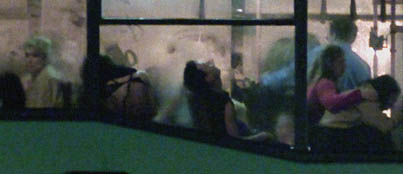Terror in Moscow (Page 3)
Finding His Way
Upon first coming to Canada in 2002, Nedkov followed his brother to Toronto. Once he'd decided to pursue an MBA and it came time to choose a university, he smiles, "I fell in love with Montreal and with McGill."
Currently in his first year of graduate studies, he anticipates specializing in marketing and earning his degree in the spring of 2005. Nedkov definitely plans to stay in Canada, but whether he remains in Montreal depends on what opportunities present themselves. He still values the business and personal relationships he's established in Moscow and intends to maintain them. He is considering a visit this summer.
It is tempting to extrapolate some universal lessons from his ordeal. Nedkov doesn't try. Sudden confrontation with mortality is the ultimate existential experience, for which there can be no adequate rehearsal. Today, Nedkov acknowledges he is changed from who he was on October 22, 2002 - maybe in ways he doesn't even recognize. Judging from his demeanour, I suspect he won't allow the incident to endure as the defining point of his life.
"For sure, I enjoy life more," he says of his renewed appreciation for how much in it there is to enjoy.
"In an odd way, the experience had been like a crash course in how to find one's way in the world," he writes in 57 Hours. "It was a process of discovering our true selves, and we cannot now escape this knowledge of who we really are."
Overall, Nedkov remains the rational, calculating thinker. Having been subjected to the will of others, he values his freedom all the more. He has found within himself reserves of courage and fortitude he never had cause to elicit before. He dwells less on small problems, more on small pleasures.
The experience has highlighted for him both the value and tenuousness of life. "On a certain level, I began to separate myself from my future. This is an astonishing sensation that will stay with me for the rest of my life."
There are still some things that can transport him back to the theatre in Moscow. The sound of Scotch tape screeching off a roller, for example, instantly recalls the securing of bombs around waists. But he doesn't linger unduly on such thoughts.
As for those who held him captive for 57 hours: he scoffs at the notion of the Stockholm syndrome, the name given an observed tendency for hostages to develop some affinity for their captors. Of course, while at their mercy, he allows, a hostage will evince empathy, but that is merely a survival mechanism, a means of convincing those holding a gun to your head that you are not an enemy.
"I have no sympathy toward them. For me, they are simply terrorists," he insists, matter-of-factly, without rancour.
"No cause can be defended by such methods."

Rescued hostages wait on a bus to be taken to hospital.
REUTERS / Viktor Korotayev


